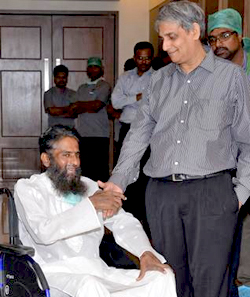Chennai, May 24: When Moulana Mohammed Zubair Ashmi's heart grew large, literally, and failed him, it was another large heart that replaced it. If hearts have nationalities, then the first was Pakistani, and the second, Indian.
The 51-year-old Pakistani religious teacher was diagnosed with a condition calleddilated cardiomyopathy' where the heart is enlarged, becomes weakened and is unable to function well. Doctors had told him that his only option was a heart transplant.
“There is no facility for a transplant back home,” he says over video, still not completely up to hobnobbing with media persons. His folks did a search and contacted K.R.Balakrishnan, director, Cardiac Sciences, Fortis Malar Hospital, here.
 He was critically ill even as he was flown to Chennai via Dubai from Lahore.To make matters worse, he was Hepatitis C positive.
He was critically ill even as he was flown to Chennai via Dubai from Lahore.To make matters worse, he was Hepatitis C positive.
Though he spent about two months in the ICU at the hospital, Ashmi's condition continued to deteriorate. Doctors had to find a donor heart for him or put him on an artificial implant device. It turns out a donor became available in March. The family of a 37-year-old man who had met with a road accident and been declared brain dead, came forward to donate the organs.
“Even if there had been a delay of two days, we would have lost him,” says Suresh Rao, chief, Cardiac Anaesthesia and Critical Care, Fortis Malar. He goes on to explain that though the donor and recipient were of two different blood groups, the tissue mapping showed a good and viable match.
Pre- and post-transplant, Ashmi's Hepatitis C viral load had to be brought down, the kidney damage managed, and immuno suppressant therapy had to be modified to suit the patient, Dr. Rao explains.
Traditional immuno suppressants affect the liver, and with an existing hepatitis C infection, extra care had to be paid to that, Dr. Balakrishnan adds.
“It is good government policy in Tamil Nadu that has facilitated a man from Pakistan to get a heart from Chennai. Goes to show that good policies have a major impact on promoting good health, not only locally, but globally too,” he says, further.
Maulana Ashmi is weak, but has gone back to talking at length. He would like to go home, to his family (his wife could not accompany him as she was denied a visa) and back to teaching in his mosque.





Comments
Add new comment